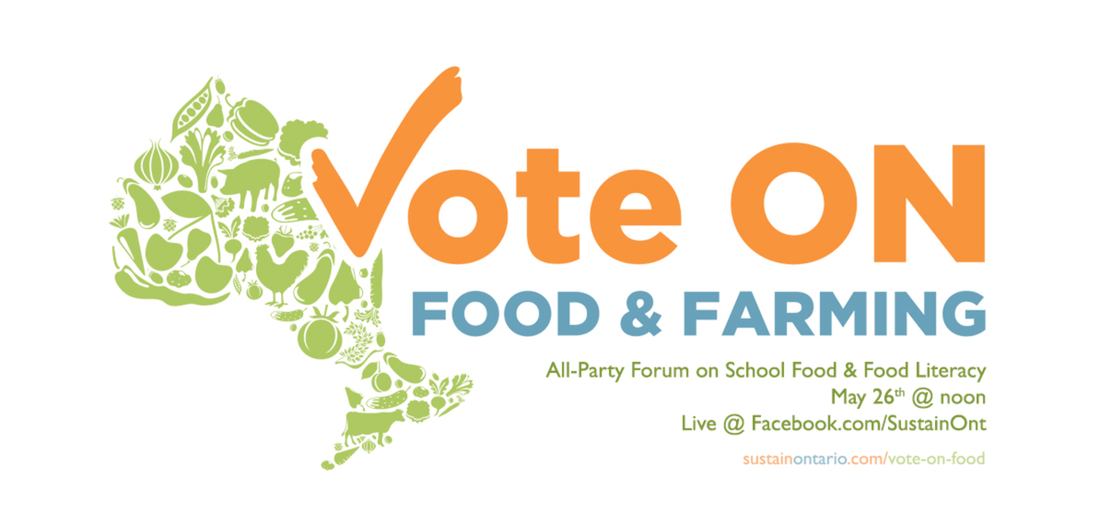|
Original post from The Toronto Star. School meals and food literacy — our knowledge and skills regarding food — are not partisan issues. We’re counting on all parties to act together. By Peggy O’Neil and Alicia Martin (Contributors) All four of Ontario’s main political parties are showing leadership when it comes to school food and “food literacy” — our knowledge and skills in relation to food. This is timely, since the federal government recently committed $1 billion over five years to developing a national program for nutritious meals in schools. And since 2020, Ontario’s Progressive Conservative government has worked to integrate food literacy into the province’s school system. As researchers who study the impacts of school food programs and food literacy, we are excited about this momentum. Food literacy provides young people with tools to actualize their health and well-being and to participate in food systems. Access to nutritious food supports the well-being of children and youth, and helps make sure they are ready to learn. In October 2020, PC MPP Daryl Kramp gained wide support for introducing Bill 216, the Food Literacy for Students Act, which proposed making “hands-on skills learned in kitchens and gardens” a requirement from grades 1-12. While the bill sailed through first and second readings, further readings stopped when the government was prorogued in September 2021. Nonetheless, Kramp and the ministry of education ensured food literacy was incorporated into the revised science and technology curriculum for grades 1-8 and the new Grade 9 science course, and have spoken about their commitment to reintroducing Bill 216. On May 26, Sustain Ontario, Brescia University College and the Coalition for Healthy School Food hosted an all-party forum on school food and food literacy. We asked candidates how they would: advance food literacy as mandatory for grades 1-12; strengthen the conditions for experiential food literacy education; address Ontario’s annual investment in the Student Nutrition Program to accommodate rising food costs and greater demand; and work with the federal government on a national, universal healthy school food program. We were pleased to be joined by candidates from Ontario’s Green, Liberal and NDP parties. All were enthusiastic about the topic and emphasized that school meals and food literacy are issues that cross party lines. The candidates spoke to the need for more education about food and healthy eating, and the necessity of teacher training and funding for infrastructure. They also spoke about the valuable school food and food literacy programs in their ridings. In their party platform, the Greens have committed to “enhanced curriculum content on critical environmental topics such as food literacy and climate change” and to “implement a province-wide nutritious school lunch program.” The Liberals have committed to “providing a free Ontario-grown breakfast for every K-12 student who needs one by expanding the Student Nutrition Program.” The NDP platform makes commitments to invest in and support the broader school system, especially the environment. As Victor Hugo once wrote, nothing is stronger than an idea whose time has come. We believe the time has come for ideas about school food and food literacy. We are counting on all parties to act together for the health and well-being of our students, and for Ontarians to consider these important issues during the upcoming election. Peggy O’Neil is an assistant professor of food, leadership and social change at Brescia University College. Alicia Martin is a PhD candidate in geography at the University of Guelph.
8 Comments
Original blog post from Rosie Schwartz, RD Where is food literacy headed for the students of Ontario?
We almost had it – legislation to teach critical life skills to Ontario students. Bill 216 – Food Literacy for Students Act, 2020 was to include the following: “The Education Act is amended to provide that curriculum guidelines shall require that courses of study be developed in experiential food literacy education and healthy eating for every grade from grade 1 through grade 12.“ In order to obtain their high school diplomas, students needed to learn about all aspects of food – from health and nutrition and food preparation skills but also about sustainable food systems, food production, food security and food safety. Bill 216 had unanimously passed second reading and, with its overwhelming support, seemed to be on its way to its final reading and Royal Assent. But then the premier prorogued the legislature in September 2021 which meant the bill had to be re-introduced and started again from scratch. A lot of work had already gone into developing a draft curriculum and as a result, was supposed to be re-introduced in February, 2022. But since the legislation wasn’t about cars and highways and actually promotes saving farmland, our government just didn’t get around to it. In March of this year, they did, however, include some changes to the science curriculum in various grades and while it was a start, it came nowhere near what Bill 216 would have accomplished. The Ontario Coalition for Healthy School Food, which involves national and provincial health, education, and indigenous organizations including the Ontario Home Economics Association (OHEA) has been working tirelessly to raise awareness about the importance of food and nutrition programs and food literacy education in Ontario schools. In a press release, OHEA states, “Connecting children and youth with healthy food, through school meals and education, has tremendous potential to improve the future of our province. Studies show that children and youth learn better when they are well-nourished and not hungry. Providing healthy and culturally appropriate food in school programs and teaching about growing, selecting, preparing, eating, and valuing food can play a critical role in promoting health and reducing chronic disease while strengthening Ontario’s economy and supporting the agri-food sector.” Next week on June 2, the people of Ontario go to the polls. And we need our candidates to speak up and make a commitment to the youth of Ontario. So what do the different political parties think about these issues? Together with Sustain Ontario, another province-wide, cross-sectoral alliance that has also been actively involved in promoting healthy food and farming, the Ontario Coalition for Healthy School Food and Brescia University College, they are providing an opportunity to find out at a virtual all-party event which will be live-streamed on Facebook. If you can’t watch it live, it will be available for viewing afterwards. The event will take place on Thursday, May 26th at 12 noon – 1 p.m. ET. The party leaders have appointed the following candidates as representatives. • Matt Richter, Green Party of Ontario, Parry Sound-Muskoka | 12 – 12:15 p.m. • Amanda Pulker-Mok, Ontario Liberal Party, Lanark-Frontenac-Kingston | 12:15 – 12:30 p.m. • Terence Kernaghan, Ontario New Democratic Party, London North Centre | 12:30 – 12:45 p.m. • TBD, Progressive Conservative Party of Ontario | 12:45-1 p.m. Candidates will answer the following four questions, provided to them in advance — If elected, what will you do to… 1. Advance food literacy as a mandatory part of the school curriculum for grades 1-12? 2. Strengthen the conditions for experiential food literacy education in Ontario schools? 3. Address Ontario’s annual investment in the Student Nutrition Program to accommodate rising food costs coupled with greater demand? 4. Work with the federal government on a national, universal healthy school food program? In our last election, about 57% of eligible voters cast a ballot. Our youth deserve better this time around. Watch the event and if you haven’t already cast your ballot, #VoteONFood. Where is food literacy headed for the students of Ontario? Read registered dietitian, Rosie Swartz's blog post here.
If elected, what will the parties do to support food literacy and healthy school food programs? Sustain Ontario invites you to join a virtual all-party event on Thursday, May 26th from 12 noon to 1 p.m. ET to hear from the following candidates that party leaders have appointed as representatives: Matt Richter, Green Party of Ontario, Parry Sound-Muskoka | 12 – 12:15 p.m. Amanda Pulker-Mok, Ontario Liberal Party, Lanark-Frontenac-Kingston | 12:15 – 12:30 p.m. Terence Kernaghan, Ontario New Democratic Party, London North Centre | 12:30 – 12:45 p.m. TBD, Progressive Conservative Party of Ontario | 12:45-1 p.m. The event will be live-streamed on Facebook and available for viewing afterward. It will be moderated by Dr. Peggy O’Neil of Brescia University College. Candidates will answer the following four questions, provided to them in advance — If elected, what will you do to…
To learn more about why we need healthy food and food literacy in Ontario schools, visit Sustain Ontario's 2022 #VoteONFood campaign here. This event is hosted by Sustain Ontario, the Coalition for Healthy School Food and Brescia University College. |
The Ontario Home Economics Association, a self-regulating body of professional Home Economists, promotes high professional standards among its members so that they may assist families and individuals to achieve and maintain a desirable quality of life. Categories
All
Archives
April 2024
|
|
Subscribe to our mailing list
|
|
Unsubscribe from our mailing list
|
Copyright © 2023 Ontario Home Economics Association (OHEA). All Rights Reserved.





 RSS Feed
RSS Feed